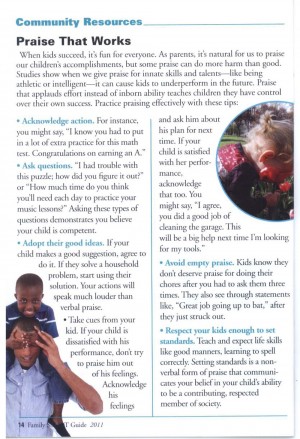Praise that Works
By Lura Frazey
When kids succeed, it’s fun for everyone. As parents, it’s natural for us to praise our children’s accomplishments, but some praise can do more harm than good. Studies show when we give praise for innate skills and talents–like being athletic or intelligent–it can cause kids to underperform in the future. Praise that applauds effort instead of inborn ability teaches children they have control over their own success. Practice praising effectively with these tips:
-
Acknowledge action. For instance, you might say, “I know you had to put in a lot of extra practice for this math test. Congratulations on earning and A.”
- Ask questions. “I had trouble with this puzzle; how did you figure it out?” or “How much time do you think you’ll need each day to practice your music lessons?” Asking these types of questions demonstrates you believe your child is competent.
- Adopt their good ideas. If your child makes a good suggestion, agree to do it. If they solve a household problem, start using their solution. Your actions will speak much louder than verbal praise.
- Take cues from your kid. If your child is dissatisfied with his performance, don’t try to praise him out of his feelings. Acknowledge his feelings and ask him about his plan for next time. If your child is satisfied with her performance, acknowledge that too. You might say, “I agree, you did a good job of cleaning the garage. This will be a big help next time I’m looking for my tools.”
- Avoid empty praise. Kids know they don’t deserve praise for doing their chores after you had to ask them three times. They also see through statements like, “Great job going up to bat,” after they just struck out.
- Respect your kids enough to set standards. Teach and expect life skills like good manners and learning to spell correctly. Setting standards is a non-verbal form of praise that communicates your belief in your child’s ability to be a contributing, respected member of society.
Originally published in Family Smart Guide 2011, by SK2R Publishing, Writer and Editor: Lura Frazey
